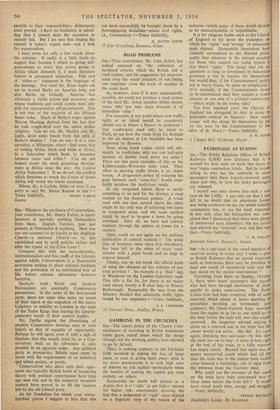$m,—'VVhatever the attributes of Conservatism, your contributor, Mr. Henry Fairlie,
is surely incorrect in specially omitting Nationalism from them. English Toryism, past and present, is Nationalist if anything. How else can one account for its loyalty to the Anglican Church—a national Church—as by law established and its tariff policies before and after the repeal of the Corn Laws ?
Compare this with the nonconformity, internationalism and free trad6 of the Liberals against which Conservatism is a Nationalist movement seeking to place national tradition and the protection of an established way of life before oversea adventures however lucrative.
Similarly both Welsh and Scottish Nationalism are essentially Conservative persuasions. In the ranks of the first-named party, there are some who make no secret of their regret at the migration of the native Uchelwyr or nobility to London in the train of the Tudor Kings thus leaving the Gwerin- peasantry bereft of their natural leaders.
Mr. Fairlie regrets the liberalising of modern Conservative doctrine seen in such beliefs as that of equality of opportunity. Perhaps he will agree, even if with a sigh of fatalism, that this simply must be, as a Con- servatism such as he advocates is only possible in an agrarian order. Any political party in present-day Britain must come to terms with the requirements of an industrial and urban society, or perish.
Conservatives who share with their oppo- nents the typically British habit of tempering theory with political opportunism have* long ago seen this and in this industrial twentieth century have moved in to fill the vacuum left by the old Liberal party. can most successfully be brought about by a thoroughgoing Socialism—minus civil rights, i.e., Communism I—Yours faithfully,
H. tLLTYD LEWIS 17 Lou Gwynfryn, Swansea, Glam.


































































 Previous page
Previous page